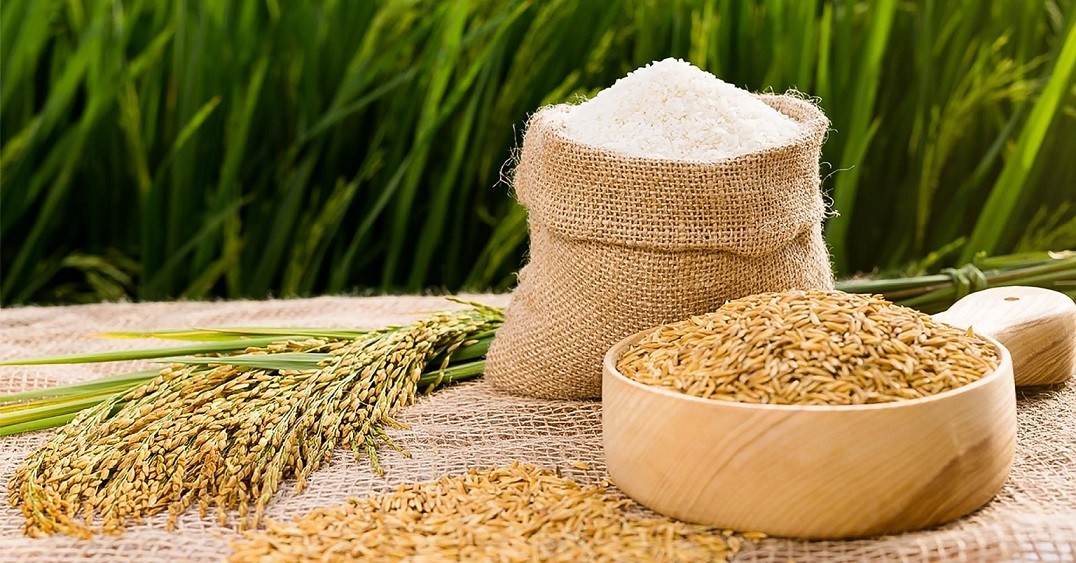 |
| Russia extends rice export ban until June 30, 2024. (Source: Shutterstock) |
World economy
OPEC+'s important tasks in 2024
The Organization of the Petroleum Exporting Countries (OPEC) on January 3 reaffirmed the bloc's firm commitment to common goals of strengthening unity and cohesion both within the bloc and with non-OPEC allies.
In a statement, OPEC said the efforts of OPEC and its allied producers, known as OPEC+, have helped the global economy overcome challenges over the past years and ensured the stability of the world energy market.
Previously, in its monthly oil market report released in December 2023, OPEC forecast that global crude oil demand would grow steadily in 2024.
According to the organization, global oil demand will increase by 2.2 million barrels per day in 2024 to an average of 104.36 million barrels per day. OPEC said that global oil demand is supported by the growth momentum of the world economy, in the context of continued economic improvement in China.
US economy
* According to Bloomberg news on January 2, the US has surpassed Australia and Qatar to become the world's largest liquefied natural gas (LNG) exporter in 2023.
Accordingly, the US will export 91.2 million tons of LNG in 2023. Exports picked up after the leading export facility, Freeport LNG, resumed operations after an eight-month shutdown due to a fire in June 2022. At the same time, countries in the European Union (EU) are looking to reduce their dependence on gas and condensate from Russia.
Chinese Economy
* On December 31, 2023, Chinese President Xi Jinping said that the country will consolidate and strengthen the positive economic recovery trend in 2024, while maintaining long-term economic development with deeper reforms.
In a televised New Year's address in 2024, Xi Jinping said China would step up reforms to shore up confidence in the economy.
President Xi Jinping expressed concern about the difficulties some businesses are facing in their operations, as well as the difficulties people are facing in their work and daily lives, and the impact of natural disasters such as floods and earthquakes in some areas.
* China's new home prices rose for a fourth straight month in December, helped by a series of government support measures, a private survey showed on January 1, 2024.
Accordingly, new home prices in China increased by an average of 0.1% in December compared to the previous month, after increasing by 0.05% in November. However, analysts said that homebuyer sentiment is still too weak for these measures to have a lasting impact.
European Economy
*On December 30, 2023, the Russian government announced the extension of the rice export ban and the ban will be effective until June 30, 2024.
The decision was made to maintain stability in the domestic market. The ban will not affect the Eurasian Economic Union member states of Armenia, Belarus, Kazakhstan and Kyrgyzstan, the regions of South Ossetia and Abkhazia. In addition, rice can still be shipped abroad for humanitarian aid or transited through Russian territory.
Russia has imposed a ban on rice exports starting July 29, 2023, with an initial term until December 31, 2023. The decision comes just a week after India, the world's largest rice exporter, banned exports of the crop to stabilize domestic prices.
* The German Reconstruction Bank (KfW) announced that it will provide more than 24 million Euros to restore and upgrade energy infrastructure in regions of Ukraine.
In December 2023, the German government provided an additional 88.5 million euros to the Ukraine Energy Support Fund established by the European Energy Community to purchase equipment to restore Ukraine's energy infrastructure damaged during the conflict with Russia.
Thus, Germany's total contribution to the Fund has reached 218 million Euros, becoming the largest donor in the total fund raised about 400 million Euros since February 2022.
* Statistics released by the German Federal Employment Agency (BA) on January 3 showed that the unemployment rate in the country in December 2023 increased by 0.1 percentage points compared to November to 5.7%. However, the BA explained that this increase was due to seasonal factors, at the beginning of the winter holidays, but in fact, the job market is still developing well.
The number of unemployed people in Germany increased by 31,000 to 2.637 million in December compared to the previous month, and increased by 183,000 compared to the same period last year.
* Czech President Petr Pavel on January 1 expressed his support for using the Euro as the currency of this Central European country and said the time was ripe to take concrete steps.
Speaking in his New Year's message, President Pavel declared: "After many years, the time has come for the Czech Republic to start taking concrete steps to implement its commitment to the euro. Despite the endless discussions about the pros and cons of the euro, for an open and export-oriented country like the Czech Republic, located in the heart of Europe, the common currency is the logical future."
* On January 1, HSBC Bank (UK) announced that its subsidiary HSBC Continental Europe (HBCE) in Europe has completed the transfer of its retail banking operations in France to Crédit Commercial de France (CCF), a subsidiary of the My Money group.
The deal is part of HSBC’s broader strategy to pivot away from non-core operations and focus on its most profitable businesses. HSBC said all necessary regulatory approvals have been obtained and the transaction is expected to close on January 1, 2024.
Japanese and Korean Economy
* Japan will strengthen energy and security ties with Central Asian countries as the resource-rich region seeks to diversify its foreign relations following the conflict in Ukraine, according to a Kazakh expert on regional issues.
Nuclear energy and other carbon-free technologies, cybersecurity, and pursuing a free and open Central Asia based on the rule of law are potential areas of cooperation between Japan and the five countries of Kazakhstan, Kyrgyzstan, Tajikistan, Turkmenistan, and Uzbekistan, said Aida Aidarkulova, executive director of Central Asian Policy Studies Unlock, a Kazakhstan-based research organization.
She also touched on nuclear energy and power plant management as Kazakhstan, Kyrgyzstan and Uzbekistan are considering building nuclear power plants in an effort to improve energy security and reduce greenhouse gas emissions.
* In a message sent at the moment of the old year's transition to the new year, Japanese Prime Minister Kishida Fumio affirmed his determination to bring the country's economy out of a prolonged state of deflation, create a new breakthrough in economic growth and improve people's income.
Prime Minister Kishida emphasized that over the past year, the indexes of wages, basic construction investment, and stock prices all increased to the highest level since the economic bubble period. This will be the premise for Japan to escape the cost-cutting trend that is currently covering the economy.
* The Ministry of Agriculture, Food and Rural Development of South Korea said on January 3 that the country will extend the value-added tax exemption on coffee and cocoa until 2025 to ease the burden on consumers amid persistently high inflation.
South Korea has applied a 10% value-added tax exemption policy on imported coffee and cocoa since July 2022, effective until December 2023.
* According to preliminary data released by the South Korean government on January 1, the country's trade balance with China will have a deficit of $18 billion in 2023. This is the first time in 31 years that South Korea has recorded a trade deficit with China.
In 2023, South Korea's exports to China reached $124.8 billion, down 20% from $155.7 billion in 2022, while imports from China reached $142.8 billion, down 8% from $154.5 billion in the previous year.
The sharp drop in exports has pushed South Korea's trade balance with China into a deficit compared to a surplus of $1.2 billion in 2022.
ASEAN Economy and Emerging Economies
* 2023 is set to be a surprisingly strong year for the Australian property market, with growth varying between cities and regional areas.
Australian property prices are still rising, but the slower pace of growth suggests affordability constraints are starting to bite, with some economists predicting another downturn in the housing market across Australia in 2024.
* On January 1, 2024, Indonesia officially applied a special consumption tax policy on electronic cigarettes, also known as vapes, to control the quantity consumed in the market.
The decision to tax e-cigarettes emphasizes the principle of fairness, taking into account that conventional cigarettes involve tobacco farmers and factory workers who have paid tobacco taxes since 2014.
Revenue from e-cigarette taxes in 2023 will reach Rp 1,750 billion (US$113.7 million), equivalent to about 1% of total annual revenue from special cigarettes. More than 50% of tobacco tax revenue will be directed to public health services and law enforcement, supporting better public services.
* Online retailers in Malaysia have started collecting low value added tax (LVG) on imported goods valued below US$108.64 (RM500).
One of the major online shopping platforms, Shopee, has officially announced the application of LVG starting from January 1, 2024. In a related move, other platforms including Lazada and China-based online retail giant Aliexpress have also started applying similar taxes.
* Experts have become more optimistic about Singapore's economic outlook for 2024 after the country's economy grew faster than expected in the fourth quarter of 2023, with the manufacturing sector finally returning to growth.
Specifically, Singapore's economy grew 2.8% in the final quarter of 2023 compared to the same period in 2022, far exceeding the 1.8% forecast by analysts in a Bloomberg survey. On a seasonally adjusted quarterly basis, the "lion island" economy grew 1.7% in the fourth quarter of 2023, extending the growth rate of 1.3% in the third quarter of 2023.
According to estimates from Singapore's Ministry of Trade and Industry (MTI), Singapore's economy will grow by 1.2% in 2023, down slightly from 3.6% growth in 2022.
In his New Year's message, Prime Minister Lee Hsien Loong reiterated that Singapore's economy is expected to grow by 1-3% in 2024, but will depend heavily on the external environment.
Source




![[Photo] President Luong Cuong presents the 40-year Party membership badge to Chief of the Office of the President Le Khanh Hai](https://vphoto.vietnam.vn/thumb/1200x675/vietnam/resource/IMAGE/2025/5/19/a22bc55dd7bf4a2ab7e3958d32282c15)
![[Photo] Panorama of the Opening Ceremony of the 43rd Nhan Dan Newspaper National Table Tennis Championship](https://vphoto.vietnam.vn/thumb/1200x675/vietnam/resource/IMAGE/2025/5/19/5e22950340b941309280448198bcf1d9)
![[Photo] General Secretary To Lam attends the conference to review 10 years of implementing Directive No. 05 of the Politburo and evaluate the results of implementing Regulation No. 09 of the Central Public Security Party Committee.](https://vphoto.vietnam.vn/thumb/1200x675/vietnam/resource/IMAGE/2025/5/19/2f44458c655a4403acd7929dbbfa5039)
![[Photo] Close-up of Tang Long Bridge, Thu Duc City after repairing rutting](https://vphoto.vietnam.vn/thumb/1200x675/vietnam/resource/IMAGE/2025/5/19/086736d9d11f43198f5bd8d78df9bd41)
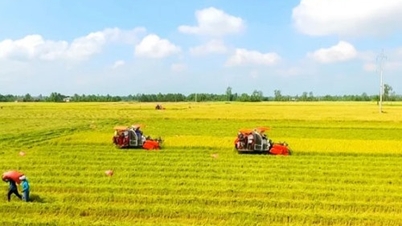



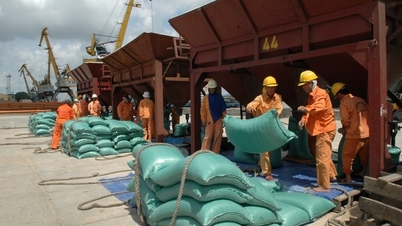






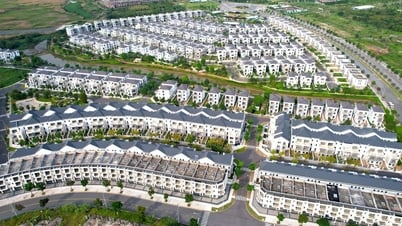



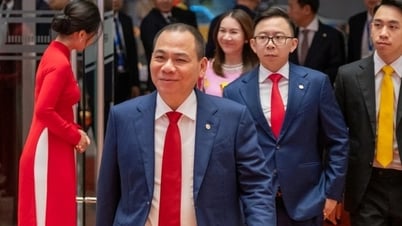







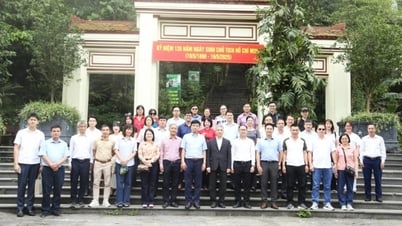





![[Photo] Prime Minister Pham Minh Chinh inspects the progress of the National Exhibition and Fair Center project](https://vphoto.vietnam.vn/thumb/1200x675/vietnam/resource/IMAGE/2025/5/19/35189ac8807140d897ad2b7d2583fbae)











































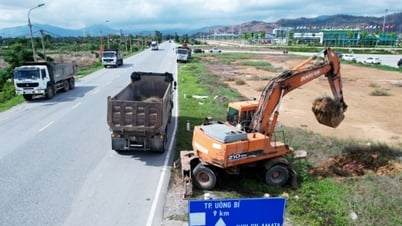

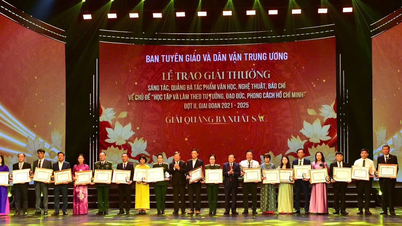







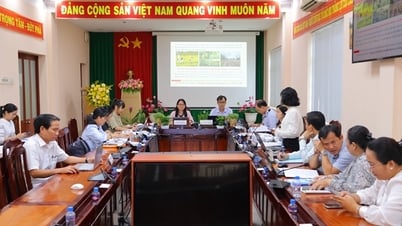




![[VIDEO] - Enhancing the value of Quang Nam OCOP products through trade connections](https://vphoto.vietnam.vn/thumb/402x226/vietnam/resource/IMAGE/2025/5/17/5be5b5fff1f14914986fad159097a677)



Comment (0)